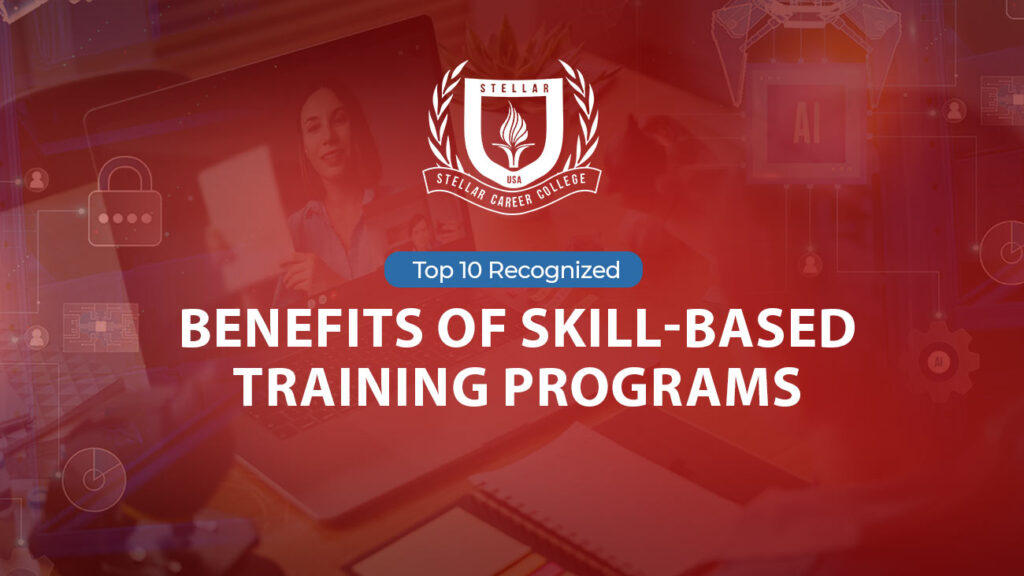The job market of today is high-paced and evolving unexpectedly, with an increased demand for skilled, trained, well-equipped professionals. The three or four-year on-site degree programs are becoming a myth as innovative and less-duration training courses have replaced traditional learning methods. In past decades, the trends are shifting towards vocational and skill-based training.
Skill-based training programs have gained expansive popularity over the years because they train students with practical knowledge in a shorter span of time, for instance, 15 to 21 months. They enable students to graduate as certified professionals and excel in their chosen careers.
This article is a comprehensive guide to the numerous long-term benefits of skill-based training programs and how they place graduates at entry levels into the diverse job market.
A Run Down of Skill Development Programs Advantages
Skill-based short-term training programs are emerging as substitutes for three to four-year university degree programs. Given their importance and adaptability, students greatly prefer vocational training over academic education. Further benefits of skill-based training include:
Specific, Focused, and Quality Training
Vocational training courses are known for diverse industry fields-centric curriculum. These are specially and critically cater students’ specific career requirements. Whether pursuing a career in healthcare, cybersecurity, information systems, supply chain management, or any other industry-relevant field, you will receive tailored training with hands-on practical learning.
Skill-based training programs ensure students are ready to enter the wider workforce and meet relevant industry needs.
Elevated Chance of Entry into the Workforce
One of the most significant advantages of skill-based training programs is high chances of entry into the global workforce. Unlike traditional bachelor’s degrees, which can take four years or more to complete, skill-based programs comes with shorter completion duration or time frame. Hence, students can qualify as certified professionals and start earning in the duration in which bachelor’s degree coursework ends.
Practical Hands-On Training
Skill-based training programs prioritize practical, hands-on learning. Rather than spending most of your time in a classroom setting, you will engage in real-world scenarios and gain practical experience. This approach not only enhances students’ skills but also ensures they are ready to tackle the challenges throughout their career development.
Practical training includes clinical expertise, IT system management experience, logistics understanding, and several other applicable skills.
Flexible Learning Modes:
Flexible learning mode is another benefit of vocational training as it helps students maintain a work-life-learning balance. Adjustable class schedules, availability of lectures on LMS, multiple time slots, and various learning formats are some examples. Therefore, skill-based training programs benefit individuals, particularly the ones with family commitments, employment, and other personal life engagements.
Vocational training courses enable students to pursue their learning process without disrupting their existing responsibilities.
Affordable Learning Courses and Financial Aid
Traditional four-year degree programs can be expensive, often burdening graduates with student loan debt. On the contrary, skill-based training programs come with aid such as interest-free payment plans, scholarships, WIOA grants, and various other financial assistance. Hence, you can not only complete your education in a shorter time frame but also save enough money for your future.
Career Advancement Opportunities
While vocational training programs prepare individuals for entry-level positions in healthcare, IT, and several other fields, they also offer career advancements to already working employees who have hit their max ceiling. With an associate degree or diploma, they can climb the ladder to higher positions. Hence, career growth is one of the prominent benefits of skill-based training.
Industry-Relevant Curriculum and Certification
Unlike traditional degrees, vocational training courses directly offer industry-relevant curriculum. Institutions that offer skill-based programs keep pace with trends, innovations, and upcoming advancements to update their course contents. Vocational institutions ensure that students receive the most relevant and up-to-date education and graduate with skills and knowledge that are in high demand.
Meets Industry Demand for Skilled Graduates
The world is evolving, and so is every industry. The expansion of businesses is leading to an increased demand for a skilled, expert, and professional workforce immediately. However, the traditional degrees take around 3 to 4 years to prepare skilled individuals, which can cause industries to lag.
On the contrary, vocational training institutes train individuals as valuable assets for multi-dimensional industries in less time. Hence, skill-based learning not only provides individuals with a solid foundation to enter various workforces but also the flexibility to choose their desired careers.
Job Security and Long-Term Stability
Another benefit of skills-based learning is its shorter duration, which does not compromise the earning potential. Vocational training enables individuals to understand both theoretical and practical knowledge to outperform in their relevant fields.
High-skilled professionals’ demands can be translated into large paying scales, and skill-based learning allows graduates to fall on merit. Ultimately, they can earn competitive salaries right after graduation.
Industry Connections and Networking
In addition to career development, skill-driven training programs often offer students the chance to build connections within their industry. Instructors guide students with tips and tricks to communicate with recruiters through real-world experience. These connections open doors to job opportunities, mentorship, and ongoing professional development.
As industries continue to grow and expand, staying up-to-date with the latest trends and technologies is crucial for professional success. Networking helps students to embrace a culture of continuous learning and adapt to changing industry demands. Hence, they can showcase their skills and make a prominent difference in industries.
Summarizing the Facts
Skill-based training programs offer many benefits that can help students pursue a well-compensated career in fields like healthcare, technology, cybersecurity, logistics, and supply chain management. Skill-driven learning programs provide specialized education, industry relevance, and the skills individuals need to thrive in the global job market.
High-quality vocational education, instant employment opportunities, affordability, and quality learning are other benefits of skill development training programs. Hence, for individuals who can not afford a four-year degree or wait long enough to begin their careers, knowledge-based learning programs are the go-to option.
Start Your Journey with Stellar Career College
Stellar Career College is committed to offering skill-based learning courses that align with industry trends and demands. We recognize the benefits of skill-based training programs but also go the extra mile to ensure our students receive quality education to pave their way into the multi-dimensional workforce.
With our associate degree programs in healthcare, Information Systems, cybersecurity, logistics, warehousing, and supply chain management, as well as our healthcare diplomas, you can enter the industry of your choice with expert, applicable, and professional skills.





